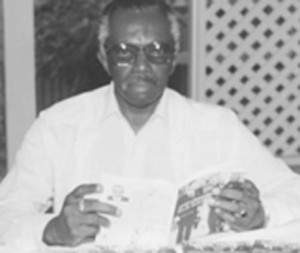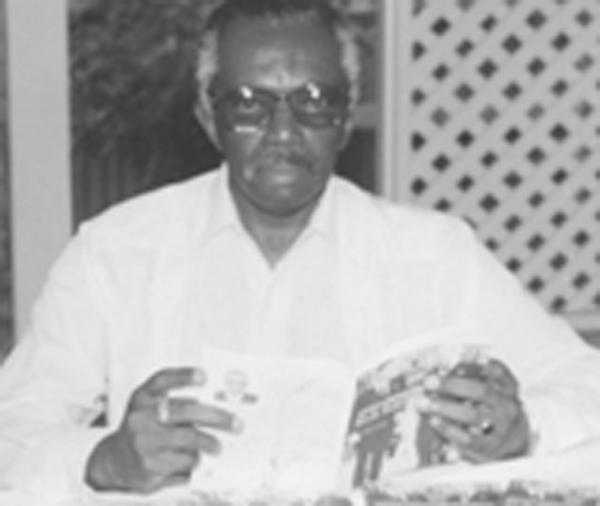By Cedric Joseph
Former Guyana High Commissioner
to the United Kingdom
A small state on the South American mainland, emerging from colonialism that left spurious claims to a substantial part of its territory, with a society enveloped in diversities can bear citizens of many hues, figuratively and literally. It has been the good fortune of Guyana to have had that corps of citizens who matured beyond the strictures of their heritage – smallness, insularity, bigotry − to venture beyond to give eloquence to the expectations of the weak and the disinherited.

It is therefore refreshing to salute the citizen who has devoted a long life to this noble service of humankind. It is also appropriate to pay this tribute to Sir Shridath on this occasion of his eightieth birthday and to share with many of his distinguished colleagues the opportunity to record an appreciation of his outstanding contribution at the national, regional, hemispheric and global levels.
The active membership of small states in the international community is a modern aberration. The diplomacy of the European dominated international community never contemplated the multiplicity of states that entered the system after the Second World War, let alone sitting and talking with them. Some current encounters reveal that the style is not absent today. It is against that measure that Sir Shridath’s achievements should be understood.
When the earlier statesmen met, say at Vienna in 1815, or at Versailles in 1919, their negotiations were powerfully supported by the armies or navies, or in later cases air forces, they were able to mobilize on the field or high seas. Their diplomacy reflected these realities of power and they pushed mercilessly to secure or to enlarge their interests. Territories were lost or gained on the field or at the table.
The new states of the post-war era were obliged to conduct a diplomacy to meet the times and to build consensus by diligent persuasion to secure their ends and/or to counter any threat to their integrity. When Guyana acceded to political independence on May 26, 1966, there was nothing academic about maintaining its territorial integrity. Some entente cordiale, which a Metternich, Canning or Talleyrand would have welcomed secure in the confidence of their military or naval power, was vital.
Sir Shridath was then Minister of State for External Affairs, Prime Minister, LFS Burnham, having overall responsibility for foreign affairs, led the defence with customary aplomb, vision and energy. These years leading up to at least June 1970 when the Protocol of Port of Spain was reached, constituted the most challenging and precarious period in the existence of Guyana when a coordinated assault from two neighbours was launched against the state.
It started in October, barely five months after independence and coincided with the withdrawal of British troops from Guyana, when Venezuela occupied the Guyana portion of Ankoko island. A series of aggressive acts on land, sea and in the international media followed culminating with Suriname’s occupation in December 1967 of the New River Triangle in Guyana.
The young state did not enjoy the benefit of any military alliance with the metropolitan power, or, it is incredible to state, even understanding in the first days of the Ankoko occupation. Despite Burnham’s strong requests for a defence agreement in the event of an armed attack by Venezuela, Prime Minister Harold Wilson rejected the idea.
Securing Guyana’s territorial integrity was the hallmark of the extraordinary network of diplomacy that Sir Shridath would conduct. He reached towards our historic friends in the Caribbean region, then to Latin America, the Commonwealth and the United Nations. As Minister of Foreign Affairs and Justice, he would reconstruct a more cordial relationship with our neighbours and consolidate Guyana’s progressive membership of the Non-Aligned Group of Nations, hosting the Foreign Ministers in 1972, the Group of 77 and the forum of the South.
This impressive diplomatic exposure honed his skills as a negotiator and his sensitivity to the problems of the small state. Conviction would urge him towards an integrated Caribbean and lead to the construction of the African, Caribbean and Pacific Group of States in Georgetown in 1975 for the negotiations with the European Community. In 1992, he held the Chair of the West Indian Commission which produced the still pertinent examination of West Indian society and identity, Time for Action, and later became the region’s Chief Negotiator.
As a Guyanese and Caribbean citizen, it was inevitable that he would come into combat with apartheid South Africa. Three terms as Secretary General of the Commonwealth yielded many achievements. Noteworthy are the Lusaka Declaration on Racism and Racial Prejudice (CHOGM, 1979) setting out the political, social and economic criteria for membership and second, refining the concept of consensus as used in reports/communiqués to reflect precisely the UK’s position as “a minority of one.”
It is fitting that his contribution to peace and justice be widely recognized in the prestigious honours he has received and in his membership of the five independent International Commissions which considered global issues during the 1980s. His work manifests a strong intellect and passion for refinement, enormous aptitude in negotiating and drafting and an attentive eye for details.

